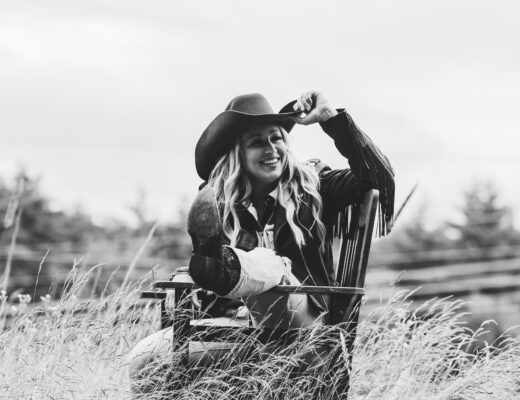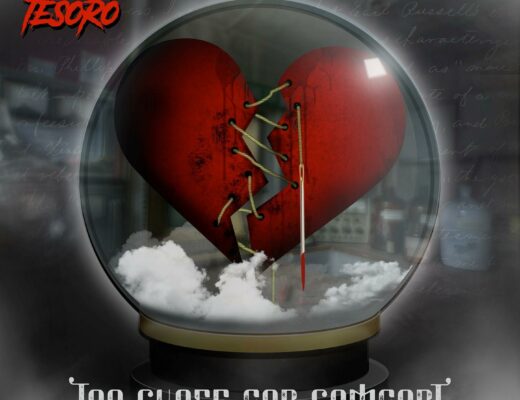In the dynamic realm of music, Sean MacLeod stands as both an architect of melodies and a sage of musical wisdom. With a rich repertoire of albums and singles like “Let the Light In” and “That’s When the Earth Becomes a Star,” MacLeod’s sonic journey transcends boundaries. In this exclusive interview, we delve into the inspiration behind his current single, “The Sweetness,” explore the narratives of his past releases, and gain insights from his latest book, “Behind the Wall of Illusion: The Religious, Esoteric, and Occult World of The Beatles.” Furthermore, MacLeod shares invaluable advice for aspiring artists.
Your current single, “The Sweetness,” carries a unique resonance. Can you share the story behind this track and how it fits into the broader narrative of your musical journey?
‘The Sweetness’ is a song I wrote many years ago. Originally, I tried to record it with a band I had some years ago, called Cisco. The song funnily enough was written when I was going through a Brian Wilson ( of the Beach Boys) stage and the lyric – ‘don’t let that worry you’ – is borrowed from Brian’s song ‘Don’t Worry Baby.’ I was also listening to a lot of Britpop bands at the time too, so it has that pop guitar feel to it. I have always been influenced by good melodies and electric guitars so the song is pretty much what Brian Wilson might have done had he been in Oasis rather than the Beach Boys :).
Lyrically, it deals with a theme that often crops up in my songs which is the kind of bitter sweet symphony that is life. I mean it is such a mad, sad, crazy, exciting, paranoid, happy, tragic, soulful, beautiful inexplicable thing we all have to go through . I mean its like we are all characters in some Shakespeare play and I think Shakespeare is ultimately right we are all just actors on a stage and if we can remember that it kind of allows us to relax a bit and not get so caught up in everything we are doing. I think the song kind of explores that idea a bit. There is a line in the song which I should really have accredited to the Romantic poet Shelley – We fall upon the Thors of life- because it is his line. I’m far from being a poet like the Romantics or Shakespeare but I like the idea of pop songs being poetry at the same time. I guess Lennon and Dylan did that really well.
Production wise I was very happy with the final result because I had decided to go into the best studio I could afford- which was Westland in Dublin. It’s a rather old study which had its main successes back in the seventies when it was recording groups like Thin Lizzy and Van Morrison. Because now a days you can get pretty good recording quality on home studios I always feel there is a kind of polish missing from the end result and that can often make the difference between an ok record and a great one.
Unless you have a big record company behind you you have to try and get it right first time round if you are going to use a studio like Westland because you can’t really afford to go back in and do it again. So, I’m really pleased I did that and I got the song sounding as good as it should
With albums like “That’s When the Earth Becomes a Star” and singles like “Let the Light In,” you’ve demonstrated a diverse musical palette. How does the upcoming album continue this exploration of different styles, and what themes can listeners expect to encounter?
Apart from the albums and singles I released with Cisco, quite sometime ago now I have released now five solo album and quite a lot of singles- which sadly very few people have heard. I don’t know really how much things have changed so much from the first solo album Cool Charisma I just try and write three-minute pop songs essentially and hope that they mean something to people. They are very much in the songwriter tradition of the Beatles, Bowie, Dylan, right through to the Stone Roses and Blur and that kind of thing. I often have lots of different types of styles and songs but mostly in the pop/rock/singer-songwriter genre. I kind of think if its a good melody and good arrangement and well produced that’s good enough and hopefully it makes people feel something, something positive about themselves or their life because that what music has done for me ever since I heard the Beatles’ ‘Penny Lane’ when I was 11
I like the idea of music progressing and I think as an artist one should always be exploring but at the same time things cannot be forced and there is no point in just trying new things for the sake of it or to be different, because that’s not really being truthful to myself and what I do, which is write simple songs. But I do play and listen to lots of different music lots of classical music which I like playing on the piano and things like minimalist composers and microtonal music which I have been exploring a lot over the last few years. Actually, the last album ‘We Don’t See that We Don’t See’ was purposefully applying different tuning systems and microtonal music to the 3 minute pop song. I was very happy with it but I haven’t actually released the album yet just some track from it because it was a bit underground and experimental and I got caught up doing the last album. But I think I’ll release it in the new year.
The new album When the Earth Becomes a Star is still in the traditional songwriting tradition, but I have elements of microtonal tunings on it to just give it that flavour. The single ‘Let the Light In’ is the first song from the album. It’s a great song and a good recording but it’s kind of a blend of Oasis meets Cream meets Gospel music 
In addition to your musical pursuits, you’ve authored books, your latest work, “Behind the Wall of Illusion: The Religious, Esoteric, and Occult World of The Beatles,” is intriguing. Can you give us a glimpse into the inspiration behind this book and others that you have written and their connection to your musical endeavours.
When I was 11 I had quite a profound experience with hearing the Beatles’ song ‘Penny Lane.’ It wasn’t even the Beatles’ version but Jimmy Osmond singing the song on the tv show Fame. If anyone is interested, you can find it on YouTube. The song just struck me right in the solar plexus and the next day I was coming home from school and saw in a record shop that I used to pass by everyday a copy of the Beatle’s Rock n Roll Album vol 2 for 2 pounds. I got the money of my mum and rush back and bought the album. When I put it on the record player- we had an old bush record player with only one speaker, but all the songs were just amazing. I mean they were better than anything that I was hearing on radio or tv at the time and I just became a fan. I was hooked. Luckily all my friends’ mums and dads still had all their old Beatles records and so I was able to borrow them all and within about two years I think I had heard most of the albums. I was reading about them all the time and that got me into other bands like the Kinks and the Who and not some much the Stones but some of their stuff and then Motown and then that got me into Mod groups and for a while I played drums in a Mod group covering lots of Jam and Who and Motown covers and then I just got into the history of pop music two-tone and punk and new wave etc. I knew quite a lot about 60s 70s 80s 90s music and one day someone gave me a Shangrilas CD. I don’t know why or why they were listening to them we didn’t talk about music. Actually, the guy just worked in my local shop and one day I went in to buy a pint of milk and came out with a Shangrilas’ CD it was quite surreal now that I think of it. I put the CD on and again I was really impressed with a lot of the songs and the productions. There were a lot of Greenwich and Barry songs on it who were a big deal songwriting couple in the 60s but I didn’t know much about them. SO I realised that there were all these girl groups out there that I had never heard, apart from the Supremes and the Vandellas and so I started to find groups like the Ronettes and the Shirelles and the Marvellettes and I thought that these groups had more or less been forgotten by history so I began to write about them and soon I had a book called Girl Groups of the 1960s and I found a publisher. I wrote another book on Phil Spector for that publisher, and I wanted to write something on the Beatles and particular from the perspective of spiritual science. That’s a kind of research developed by the Austrian philosopher and seer, Rudolf Steiner. His philosophy is essentially that man is a spiritual being and that there is a kind of spiritual cause behind or involved in everything we do here in this world. I am very interested in that, and I think music is something that very much relates to that because it’s not quite physical or tangible in a sense. I think the Beatles were very interested in that and the whole 1960s culture was tapping into and exploring these ideas. The experimentations in music and drugs and even social changes I think can be seen from this perspective. I don’t think Steiner would necessarily have seen every aspect of the 1960s culture or music as positive but certainly we can try to understand the spiritual impulses behind the events of that period which, as I said the groups and the people of the time were dimly aware of and trying to penetrate deeper into what we might call the invisible realm or the super-sensible realm.
Today, I think this is kind of difficult because we are so much more immersed in technology and in the material world- living in the material world as George Harrison might say- that we are becoming or have become more disconnected from what I think is our spiritual nature. Although it’s quite clear, due to a lot of stuff that has happened over the last three years that people are beginning to what to know more about these things. So that’s kind of what the book is about, and I guess what my songs try to be about.
Looking back at your previous releases and forward to your upcoming projects, how do you see your artistic evolution? Are there specific moments or experiences that have significantly influenced your musical journey, and if so, how do they manifest in your work?
Yes, as I said my experiences with the Beatles ‘ music was a major point in my life which began me wanting to know more about musical and to be a songwriter. Apart from that specifically my interests are more related to philosophy and that has influenced a lot of how I think about music maybe. I think my whole life has been connected to music, so it was kind of like for me a destiny moment meeting the Beatles because they opened up something in me that was able to enter into the world of music and my journey through life has been inextricably linked to my musical journey. I think there for example is a spiritual science moment. Of seeing something happen in your life that comes to meet you and moves you in a certain direction. It has nothing to do with me its something outside me but it has a tremendous impact on my life and my life, like everyone’s, has a tremendous impact on so many other people, in fact on the entire world. So, trying to understand that event and other similar events in our lives is a way of bringing us into contact with these impulses that are kind of invisible. I guess some people might call it chance or coincidence and that all things are chance, but one thing is that it has a profound meaning for me and that as I said influences everything and everyone around me. If it is just a chain of chance events then there is no real meaning, which of course some people might say, but if there is no real meaning then why do we feel the need to give it meaning, why is meaning inherent in our lives? Anyway, the point here is to think about these things and be open to them rather than having to prove they are right or wrong. Because ultimately, we cannot really prove anything only know something is as it is or experience it as so.
Embarking on a career as an independent artist often involves navigating uphill battles and overcoming challenges. Can you share some of the significant hurdles you’ve faced in your journey and the strategies you’ve employed to surmount them, providing insights for emerging artists grappling with similar obstacles?
There are so many uphill struggles and failures and disappointments and challenges.
Playing live on national radio and putting your capo on the wrong fret on the guitar and then singing the song in one key and playing the guitar in another is a pretty embarrassing moment – though I did manage to get my voice intone after a few seconds
Playing gigs to nobody is hard. Making records that no one hears is not very satisfying trying to get gigs and find other outlets for your music is hard. Feeling at times you aren’t any good is a struggle at times. But strangely I find as I said at the start if you see it as a space to learn and grow and see yourself as an actor on the stage it suddenly doesn’t seem as bad as you thought. You can actually enjoy it all. That’s what I have learned and every day you get better as a performer, a writer, a recording artist. You get to the point where you can say I am a musician. I am a songwriter. I am a recording artist. And it’s a bit like being able to do something around the house like cut the grass or something. You just do it and enjoy doing what you do and try and get better at it. That bit requires concentration. I mean to concentrate on what you cannot yet do and keep at it focusing even for ten minutes a day until you crack it. Mostly likely if you keep at it, you’ll do it. But of course, you need to know what you can do and what is the most realistic step to take next. That I think is important. So, I know that I am a songwriter. I have been honing that craft for many years I know I can play various instruments and that I can sing to a certain degree. So I stay within that comfort zone but I know that If I spend ten minutes a day playing a certain thing on the piano that I cannot quite do so well yet I will be able to do it in a few weeks and I keep doing that until in a years’ time I can do all the things I could do a year ago and now I am on a higher level and can do more things as a musician and feel confident do that. But I need to give a few minutes every day to it. Steiner would say that it is not so much spending hours every day doing something that helps us master something but doing something even only 5 minutes is what is important because this activity we absorb into our being and after a time because who we are. I think this is true. So, you just keep doing the thing you want to do every day.
Unfortunately, if you want to be successful in a materialistic sense like be famous or rich from it then you might be forever disappointed because these things are often nothing to do with our own inner capacities. Fortune is just that something that is gifted to us from the gods but if we focus on our capacities that will give us joy and others joy too and then who knows the gods might smile on us.




No Comments